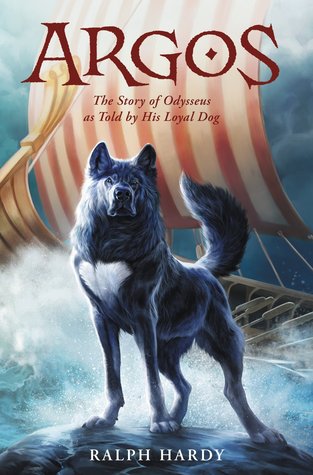 Hardy, Ralph. Argos: The Story of Odysseus as Told by His Loyal Dog
Hardy, Ralph. Argos: The Story of Odysseus as Told by His Loyal DogMay 31st 2016 by HarperCollins
Copy provided by Young Adults Books Central
Argos is Odysseus' loyal dog, who was also called Boar Slayer, since he was the only survivor of a boar attack that killed his mother and littler mates. When his master goes off to fight in the Trojan war, Argos stays behind to protect Penelope and the young Telemachus. After the war is over, Argos gets news of Odysseus' escapades on his return home from a variety of creatures who relay them to him. This way, the reader gets to see the events of the Odyssey in relationship to the occurrences back in Ithaka. Argos fears for his master's safety but is powerless to do anything; he also can't help Penelope as much as he would like. Once Odysseus finally makes his way home, Argos lays down his weary burden, so Odysseus is aided in his difficult return to his home by Argos' son, Leander.
This is a very clever way to retell the Odyssey for today's readers, and I think that this is a great example of Homeric tradition-- tell the same story, but add a new and unique twist on it. I've always thought it was a little odd that Odysseus' story is told mostly in flashbacks, so this is a great way to lay out the timelines of both Odysseus and Penelope so we can understand how they occurred together.
Argos is a figure who has a small but significant role in the original story, but even though his appearance is brief, it definitely captures the imagination. Did the dog really live for over 20 years, waiting patiently for his master? It's interesting to see the intrusion of the suitors from Argos' point of view, and Telemachus also becomes more of a fully fleshed character when shown interacting with Argos.
Hardy definitely clearly loves this story and has studied the various translations of the Odyssey and remains true to the original story. For high school readers who are offered a watered down version of The Odyssey in a literature textbook, this will provide more details in an interesting fashion. There are so few books set in ancient Greece that readers who crave books set during this period will pick this up avidly.
At almost 400 pages, this is a bit long, and the pacing is a bit slow. The prose is oddly stilted and outdated. (page 87, ARC- "This did Eurylochos see with amazement, and then he stealithy crept back along the trail toward the black ship... But when he arrived, so great was his grief and despair that he could not speak, but only cry out in lamentations for many hours.") I've read the Odyssey in Greek, and I know how easy it is to fall into the trap of making one's translation sound like something written in the 1800s, but I wish Hardy had managed to avoid this!
 Boyle, Keri Claiborne and Sneider, Jonathan. Teddy the Dog: Be Your Own Dog
Boyle, Keri Claiborne and Sneider, Jonathan. Teddy the Dog: Be Your Own DogMay 17th 2016 by HarperCollins
Copy provided by Young Adult Books Central
Teddy has a great dog life, creating all kinds of havoc but being too cute to be held responsible for it. Then, his aunt sends him a cat. He's none too pleased, but lacking any way of getting rid of the cat, he instructs her on all of the fun parts of being "your own dog". While the cat doesn't care much for riding in cars or bathing in wading pools, the two eventually reach some common ground.
Teddy is appealingly drawn, and the bright colors and simple line drawings lend themselves to reading this to young children and asking them to point out different objects. Teddy is definitely a hipster dog who appeals to adults-- much of the merchandise on the web site is geared toward an older market.
While Teddy originally is leery of having a cat, he keeps an open mind and tries to introduce the things he loves best to the cat, who in turns teaches him a trick or two.
Teddy is rather a bad dog. He is shown getting into various kinds of trouble, but it is treated as simply cute. Sylvie does NOT agree. She always does what she is told to do! (I'm sure that hipster parents will love this book... and those same parents will complain when their child loses a book that he shouldn't have to pay for it because someone else took it...)































No comments:
Post a Comment